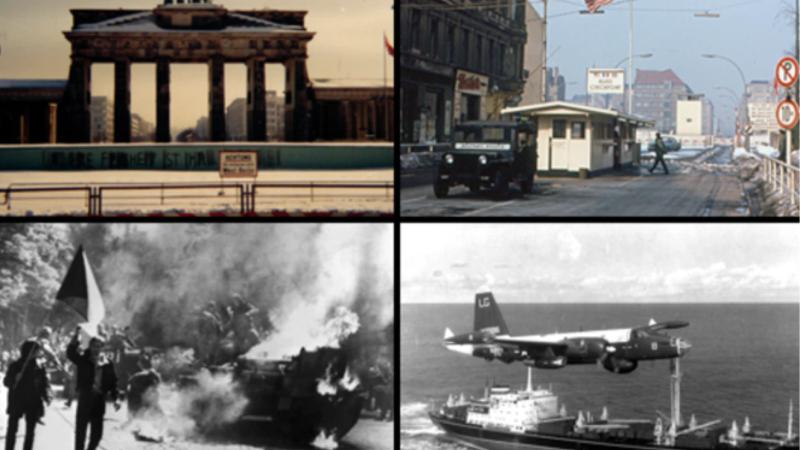WW2 ALLIANCES AND THE DAWN OF THE COLD WAR
COMMENT
SHARE

Directly, WW2 didn’t cause the Cold War; however, there were plenty of factors that set the stage to make it happen. For decades, the world was on edge as the Soviet Union did everything it could to spread communism while the United States did everything it could to prevent it. Such attitudes would lead to arms races, new policies, and advancements as both sides found themselves in a power struggle in a post-World War II world.
WW2 Alliances and Origins of the Cold War
Several factors would bring about the Cold War following WW2. While not directly the cause, World War II provided plenty of tension between two new world superpowers—the United States and the Soviet Union.
Even though both parties were allies during WWII, the West didn’t trust the USSR and remembered Stalin's 1939 nonaggression pact with Hitler.
Therefore, the two newfound rivals were already on shaky ground when competition would create a breeding ground for contempt.

Containment
While Franklin D. Roosevelt envisioned peace in the postwar world, tensions rising with the Soviet Union hindered his goal.
The 1917 Bolshevik Revolution and the spread of communism fueled long-standing global fears but the specific tensions in Europe after the fall of Nazi Germany brought forth territorial ambitions from the Soviets.
Less than two years following the end of WWII, the U.S. adopted a containment policy to limit Soviet influence globally under President Harry Truman.
The Truman Doctrine pledged U.S. support to nations threatened by Soviet aggression, shaping foreign policy and growing Cold War sentiments around the world.
Furthermore, containment inspired the domino theory, which was the idea that if one country fell to communism, others would follow.
These policies would lead to the most violent parts of the Cold War era, including the Korean and Vietnam Wars where both nations were heavily involved but did not attack each other directly.
Espionage and an Arms Race
WW2 didn’t directly cause the Cold War but the conditions were in place to keep the two sides emerging from the conflict at odds for decades to come.
Further exasperating the issue would be espionage, a growing effort on both sides to learn the other’s secrets, sabotage policies, and hinder each other's global power.
Especially with the dawn of nuclear weapons, a sprawling arms race would have both sides looking to gain the advantage over the others through intel.
Espionage efforts began early in the Cold War, with the Soviets focusing on stealing U.S. nuclear weapons secrets, including Klaus Fuchs, a spy who stole U.S. nuclear secrets while working on the Manhattan Project, leading to the first nuclear test by the USSR in 1949.
The arms race spurred military and technological competitions, including the recruitment of German scientists by both nations.
One famous example was the American efforts of Operation Paperclip, which would see the U.S. more than 1,000 former Nazi scientists to aid in Cold War research after WWII.
The contributions of these scientists would lead to significant advancements in American missile and space technology, while those working with the USSR bolstered its own military and technological abilities during this time.

Impact of WW2 Nuclear Weapons on Cold War Dynamics
While it’s true both sides of the Cold War grew their tensions through a nuclear arms race, the irony is, that same race is also what kept the conflict from escalating.
After dropping nuclear weapons in World War II, the world came to truly understand the weight of their power and by doing so, also realized that if too many went off, the end theoretically was unavoidable.
The idea of mutually assured destruction (MAD), an idea partly responsible for keeping nuclear war from breaking out today, is why despite high tensions, the Cold War stayed cold.
In many ways, the Cold War's aftermath continues to influence global military and national security policies today.
The U.S.-USSR standoff impacted all aspects of postwar life, shaping the modern world order and even if WW2 didn’t directly cause the Cold War, the ripple effects were significant enough to still influence modern warfare and policies.
Read next:
Join the Conversation
BY BUDDY BLOUIN
Buddy Blouin is a Contributing Writer at VeteranLife.com
Buddy Blouin is a Contributing Writer at VeteranLife.com



